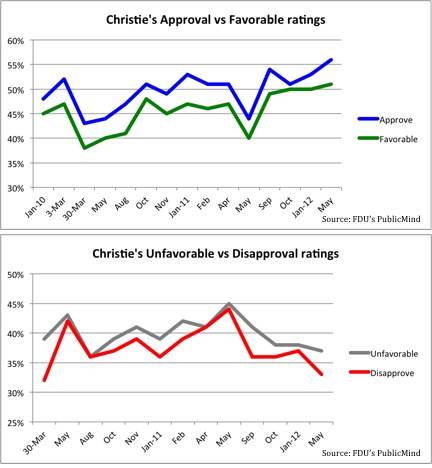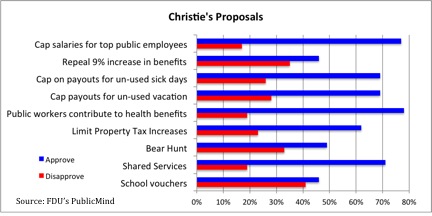
An important secret of the Big Man in New Jersey begins as a mystery. Observers note that the governor's favorability ratings in the Garden State typically lag behind his job approval ratings. Favorability ratings tend to reflect more on personality. Approval ratings reflect more on policy. One question asks, do you have a favorable or unfavorable opinion of Christie? The other question asks whether you approve or disapprove of the job Christie is doing. Subtle, but important. And Christie's numbers are the mirror opposite in this regard from President Obama's, whose favorability (personal) ratings have tended to exceed his job approval.

Some who try to resolve this difference are happy to explain that Christie has tragic personality flaws: he is a bully, intemperate of mouth, confrontational, unwilling to compromise. But such description is quickly countermanded by the hilarious tales Christie tells to rapt audiences, his willingness to poke fun at himself and the most recent reports of his sincere boosterism for All Things New Jersey.
The better explanation for his favorability ratings lagging behind his job approvals is that he is a Republican in a Democratic-leaning state, and thus partisans of the opposite stripe are psychologically obligated to object, at least until they consider whether they like or dislike his policies. Put the other way 'round, Christie's job approval leads his favorability ratings because his policies poll well. In fact, many Christie proposals poll not just well, but very well, and lead both his favorability ratings and his job approval ratings.

So, forget his personality. Those pesky voters ultimately want to know what you are planning to do in that public office to alleviate their perennial misery. In this sense, Christie's conservative message is the right kind at the right time: fiscal. Wandering into social issues is not part of his plan. Gun rights, abortion and gay marriage are not subjects on which he wants to elocute. Keep it about the money.
Taxes out of control? Yeah, baby!
Outlandish payouts for public employees? Sickening.
Corruption? I. Am. Splenetic.
Crappy urban schools even after a few billion dollars? Outrageous!
Legislators getting paid twice for their public jobs? Choking back vomit.
Carping remarks amplified by newspaper salesmen? Shut. Up. Numb. Nuts.
But, still, it's not the personality. It's the policy.
One exception to Christie's populist sense, some said recently, would be the scheme to merge a branch campus of Rutgers University with an obscure state college in rural south Jersey. Alumni hearts were in a-fib. Professors were apoplectic. Cynics pounced. The local press purred. But an MU poll showed that most New Jerseyans hardly gave a fig: 56 percent said they neither approved or nor disapproved, but didn't know, didn't care, or didn't care to know. Among the remainder, 20 percent said it was a good idea, 22 percent said it was a bad idea. Snore.
Similarly, there are many issues on which Christie is criticized, or praised, in his state but the impact of these must be discounted so long as they are not at, or even near, the top of central issues broadly shared by voters of both parties. The central issues have to do with money: taxes, spending, the economy. It is not a secret of success for a politician to promise to follow the wishes of the electorate, but actually to stick to campaign promises is much easier said than done. It is not that Christie said he would follow the wishes of electorate and pursue reform, but that either he has pretty much done as he said he would do, or that many voters at least perceive that he has stuck to his platform.
Naturally, his professional opposition in the Garden State has been trying hard to get him to egregiously break a promise. This is largely the reason the legislature's majority party has pushed so hard to pass a "millionaires tax", raising the marginal tax rate on high earners. It is also the reason that Christie refused to go along with any such proposal.
Similarly, he relished the cancellation of a new tunnel into New York that had been in the works for years. While the state technically had enough money in its transportation fund to pay for its share of the project, cost overruns would have been billed exclusively to New Jersey. But, more important, there would have been only crumbs left to fill potholes on the notorious and essential Turnpike -- meaning he would be forced to raise the gas tax or tolls.
In short, he is not about to pull a George Bush (41) and go back on his no-new-taxes pledge, despite that polls repeatedly show New Jersey voters are quite willing to raise taxes on other people in the state -- just not on themselves. Christie realizes that every tax proposal is a poison-pill, designed to ruin him. If he raises taxes, even on the rich, he becomes a pledge-breaker and mistrusted by a broad, middle swath of voters. If he does not raise taxes, even on the rich, he will be merely a Republican. To date, he has chosen the latter.
Dan Cassino and Peter J. Woolley are professors of political science at Fairleigh Dickinson University in Madison, New Jersey. Cassino is Director of Experimental Research for the University's research group, PublicMind: Woolley is its founding Executive Director. This is the second in a series on Chris Christie.